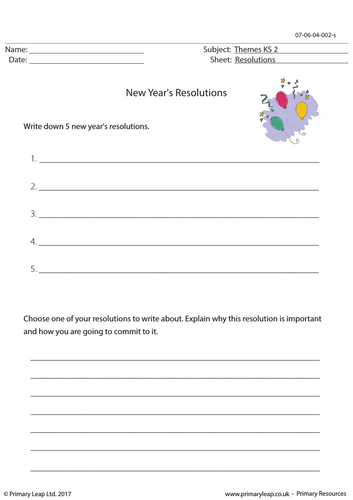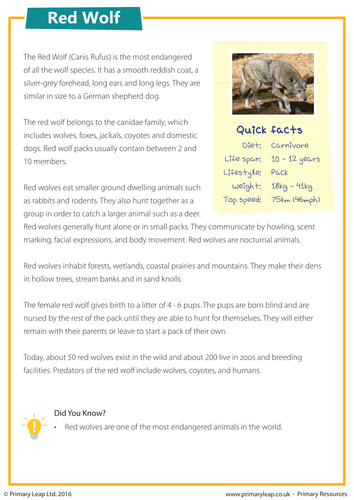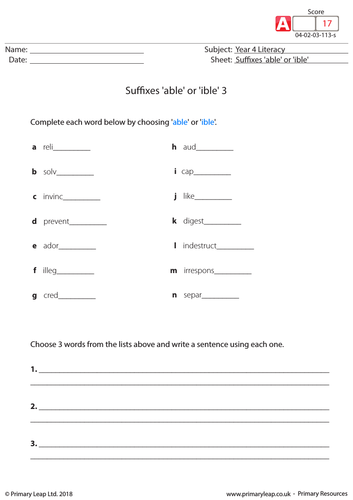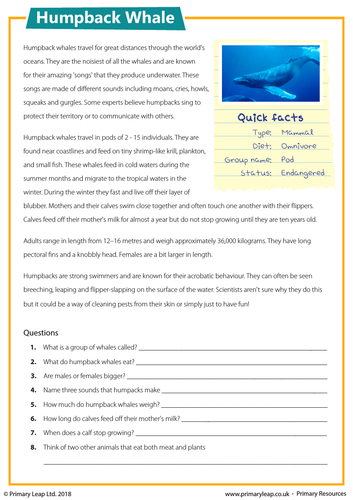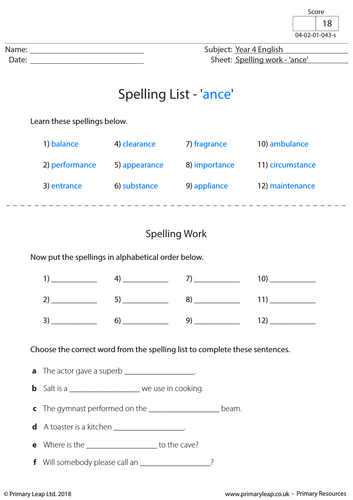560Uploads
453k+Views
210k+Downloads
All resources

New Year's Resolutions Worksheet
Students write down five new year’s resolutions. They then choose one of their resolutions to write about and explain why it is important to them and how they’re going to commit to it.
This worksheet was created by primaryleap.co.uk

Reading Comprehension - Red Wolf
This KS2 reading comprehension includes a passage with some interesting facts about the red wolf. Children read the text and then answer the questions that follow. This worksheet was created by primaryleap.co.uk

English Worksheet: Adverbs with Suffix - ly
This year 3 English resource is designed to encourage children to use adverbs with suffix - ly. Students write their own sentences using the words provided.
Additional worksheets, lesson plans, and interactive activities are available on Primary Leap.

KS2 English Resource - Suffixes 'able' or 'ible'
A KS2 literacy worksheet focusing on the suffixes ‘able’ and ‘ible’. Students complete each word by choosing ‘able’ or ‘ible’.
This worksheet was created by Primary Leap

Cloze Activity - Changing State
This science worksheet includes facts about changing state. Students read through the sentences and fill in the missing words. There is a word bank included to help them complete each fact.
Find more resources at Primary Leap

Verb prefixes - dis and mis
A prefix is a group of letters added before a word to alter its meaning. The prefix ‘dis’ is generally used to make a word negative. The prefix ‘mis’ means badly, wrongly or incorrectly. This English resource asks students to choose the correct word to complete the sentence.
This worksheet was created by Lauren Savage

KS1 - Addition Word Problems 2
This worksheet was created by Lauren Savage @ Primary Leap
Addition word problems. Children can practise their calculation skills with this addition word problem resource.

KS2 Reading Comprehension - Charles Dickens
Charles Dickens was born on 7th February in 1812. Celebrate his birthday with this reading comprehension including some interesting facts and information about the famous writer. Students read through the text and answer the questions. This resource was created by Lauren Savage @ Primary Leap

To, Too or Two?
Use to as a preposition before a noun or as an infinitive before a verb. Use too as a synonym for also or to indicate excessiveness before a verb. Use two to spell out the number 2. Students choose to, too or two to complete each sentence.

KS2 Reading Comprehension - Humpback Whale
This year 5 English worksheet includes a short passage with facts about humpback whales and questions to follow.
This worksheet was created by Primary Leap

Making Inferences from Pictures 3
Inferences are what we figure out based on an experience. Helping students understand when information is implied, or not directly stated, will improve their skill in drawing conclusions and making inferences which is an essential skill in reading comprehension. Students are asked to look at the picture and then answer the questions.
Find more resources at Primary Leap

KS2 English worksheet: Phonics - 'ire' and 'ear' words
This English worksheet asks students to complete the sentences by choosing the correct word from the word bank. This resource focuses on the phonics ‘ire’ and ‘ear’.
This worksheet was created by Lauren Savage @ Primary Leap

Match the Contractions - English Resource
A contraction is a word made by shortening and combining two words. Words like can’t (can + not) and don’t (do + not) are contractions. Students draw a line to match the contractions.
Additional worksheets, lesson plans, and interactive activities are available on Primary Leap.

Cloze Activity - Anne Frank
Who was Anne Frank? Why is Anne Frank Famous? Find out some facts about Anne Frank by completing this cloze activity. There are 12 facts that students must fill in using the word bank to help them.
This worksheet was created by Primary Leap

Labelling Parts of the Human Body
How well do your students know the parts of the human body? This worksheet was created for young learners to help them label the parts of the human body. It will also help with their spelling skills. Find more resources at Primary Leap

Common Exception Words 2
Common exception words are ‘tricky words’ to read. Some exception words are used very frequently, which is why children should start reading and writing them at an early age. This English resource helps students practise reading and writing common exception words. They are asked to read the word and use it in a sentence.
Find more resources at Primary Leap

KS2 English Worksheet - Spellings 'ance'
A KS2 English resource including a list of 12 words ending with ‘ance’ for students to learn. There are exercises including putting the words in alphabetical order and choosing the correct word from the spelling list to complete the sentences.
This resource was created by Primary Leap

Relative clauses
Relative clauses are used to connect sentences. We use relative clauses to give additional information about something without starting a new sentence. The most common relative pronouns are: who, whom, whose, which and that. This English resource asks students to choose the best relative pronoun to complete the sentences.
This worksheet was created by Lauren Savage

Reading comprehension - Christmas in France
This worksheet was created by Lauren Savage @ Primary Leap
What happens in France at Christmas? Students are asked to read the text and answer the study questions.

Type of sentences: statement, command, question and exclamation
This worksheet was created by Primary Leap
A statement gives us information
e.g. the sky is blue.
A command tells us to do something
e.g. go and brush your teeth.
A question asks us something
e.g. how old are you?
An exclamation shows us that someone feels strongly about something
e.g. ouch!
Students read the sentences and write statement, command, question or exclamation next to each one. They also need to add the correct punctuation at the end of each sentence (., ?, !)

